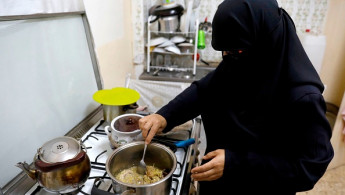HRW: Jordan's World Bank-funded poverty-tackling algorithm plagued by 'stereotypes, errors'
Human Rights Watch (HRW) said on Wednesday that the World Bank funded algorithmic programme used by Jordan to determine eligibility for benefits "deprives people of their rights to social security".
The HRW report concluded that the Takaful program, an application that Jordanians use to apply for cash assistance, determines "who receives benefits based on errors, discriminatory policies and stereotypes about poverty".
"Many people in Jordan are not getting financial support because their hardships don’t fit an algorithm's rigid model of what poverty should look like," Amos Toh, senior technology and human rights researcher at HRW, said in a statement.
Takaful was created in 2019 with the help of the World Bank in an attempt to create a "modernised" and targeted social support programme as the Jordanian government removed subsidies on basic goods.
Around 120,000 households received between $56 to $141 per month in support through Takaful in 2022 – equivalent to around 20 percent of Jordanian households under the poverty line.
The programme has a criteria for what makes individuals and families eligible for cash aid, evaluating 57 different factors including the amount of electricity consumption, employment and home ownership.
HRW has said that some of this criteria is arbitrary and is ineffective at evaluating if a Jordanian is in need of assistance or not.
For example, if an individual owns a car, livestock or a business, they could be prevented from receiving cash benefits, regardless of whether or not their overall economic situation is dire.
The algorithm also re-enforces gender-based discrimination in the way it distributes cash aid, HRW alleged.
The head of households are automatically assumed to be the male and so cash is given directly to men rather than women, increasing the dependence of women on male figures.
Jordanian women married to non-nationals are discriminated against, as women cannot pass their citizenship onto their children and the algorithm only considers Jordanian households as eligible for assistance.
Unemployment in Jordan is high, at 22.6 percent in the second quarter of 2022.
Jordan also has one of the world's lowest female labour participation rates at 14 percent.
Perceptions of declining living standards, coupled with increasing fiscal austerity, has led to popular protests and labour actions in Jordan.
Targeted poverty assistance programmes, such as Takaful, were meant to make social support more affordable and more efficient.
The World Bank has financed similar algorithm-based poverty targeting programmes in at least eight other countries in the Middle East and North Africa.
The Bank has said that poverty targeting is the most affordable and effective way for countries to continue to provide social protections while under financial stress.
HRW has warned that such programs risk simplifying the multidimensional aspects of poverty and unduly disqualifying individuals for social support, as Takaful does in Jordan.
"The World Bank should finance technology that supports universal social protection, instead of undermining it," Toh said.
The World Bank is working with the Jordanian government to improve the targeting algorithm and is evaluating its effectiveness, it said.
HRW recommended that countries adopt universal social support schemes instead, which would eliminate the errors which have disqualified people in need in the past.
In Jordan, a "modest" package of universal social protection for needy populations would cost around $394.7 million, or about 1 percent of GDP during the first year of its enactments.





 Follow the Middle East's top stories in English at The New Arab on Google News
Follow the Middle East's top stories in English at The New Arab on Google News


